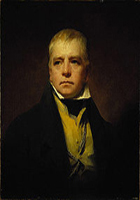Answer Poem by Sir Walter Scott
Answer
Sound, sound the clarion, fill the fife!
To all the sensual world proclaim,
One crowded hour of glorious life
Is worth an age without a name.
No No not every poem written by a soldier is a call to arms. God forbid! ! ! Has no one else read Wilfred Owen and so many other poet soldiers of similar ilk? Who spilled their ink and blood lost in the mud while Consciousness Objectors. Who believed they had no right to speak out against such wars unless they fought. Please read Wilfred Owen, those exceptional anti-war protests.
[i remember happy hour in sydney, australia when they ring bell we stand up and toast to a nameless mate... thanks mate; good day mate. that's glorious ain't it] md
love your poem thank you for sharing it. It is marked with powerful insight and wisdom.
The poem is a paeon to the glory of war the sound of which was drowned out by the machine guns in WWI. Is the word 'sensual' redundant? I google that it was quoted as anonymous by Scott, and taken up by the world (including Quiller-Couch's 1919 Oxford anthology, I see) as Scott's because it is like his style. But it was actually written by Mordaunt as part of a larger poem - to whom it is now rightfully attributed. I cannot imagine a poet of Scott's fame would plagiarise four lines. If Mordaunt is in heaven is he grateful to Scott for rescuing him from 'an age without a name'?
A poignant work of art.......................................
A short, succinct poem with a whole lot of meaning. A glorious life with rich experience lived well is worth an age!
One brief moment of fame and notoriety is preferrable to a life unnoticed? Sometimes Fame can be unfortunate and sometimes better than nothing..Very few people can handle the attention fame brings unless they seek their moment in the Sun..

The poem is a paeon to the glory of war the sound of which was drowned out by the machine guns in WWI. Is the word 'sensual' redundant? I google that it was quoted as anonymous by Scott, and taken up by the world (including Quiller-Couch's 1919 Oxford anthology, I see) as Scott's because it is like his style. But it was actually written by Mordaunt as part of a larger poem - to whom it is now rightfully attributed. I cannot imagine a poet of Scott's fame would plagiarise four lines. If Mordaunt is in heaven is he grateful to Scott for rescuing him from 'an age without a name'?